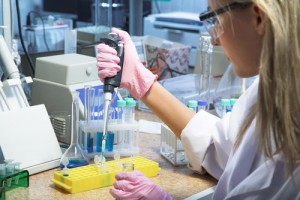 Researchers from Saint Louis University Medical Center have discovered a way to prevent type 1 diabetes from a mice model of the disease. The new approach developed by the scientists stops the destruction of beta cells and preserves the production of insulin. Findings of the said study were published in the journal Endocrinology.
Researchers from Saint Louis University Medical Center have discovered a way to prevent type 1 diabetes from a mice model of the disease. The new approach developed by the scientists stops the destruction of beta cells and preserves the production of insulin. Findings of the said study were published in the journal Endocrinology.
Type 1 diabetes is a chronic disease characterized by destruction of the pancreatic beta cells by the body’s immune system. These cells produces insulin in the body, which results in insulin deficiency and hyperglycemia when the immune system begins to destroy them. Current therapy to treat the said disease include controlling blood sugar levels with insulin therapy, which continues for the rest of the patient’s lifetime.
The research team, headed by Thomas Burris, Ph.D., chair of pharmacological and physiological science at Saint Louis University, worked on trying to block the autoimmune process that destroys the beta cells, leading to diabetes. The scientists already knew that two typs of immune T-cells play a role in the development of type 1 diabetes. However, the role of a third type of T-cell called TH17 was still unclear.
The researchers discovered that two nuclear receptors play important roles in the development of TH17 cells. By targeting these receptors in mice models, the scientists were able to stop autoimmunity from developing, thereby sparing the beta cells from destruction. The blocking of the receptors, called ROR alpha and gamma t by a compound called SR1001was able to reduce the incidence of diabetes in mice treated with it.
The results indicate that TH17 may play a significant role in the development of type 1 diabetes. It further suggests that developing drugs that will target this cell type may be a potential treatment for the said disease.
Source: Saint Louis University Medical Center. (2015, January 20). Researchers prevent type I diabetes in mouse model. ScienceDaily. Retrieved January 27, 2015 from www.sciencedaily.com/releases/2015/01/150120111248.htm
Tags: autoimmune disease, beta cells, blood sugar levels, Diabetes News, diabetes prevention, insulin production, mice model diabetes, type 1 diabetes